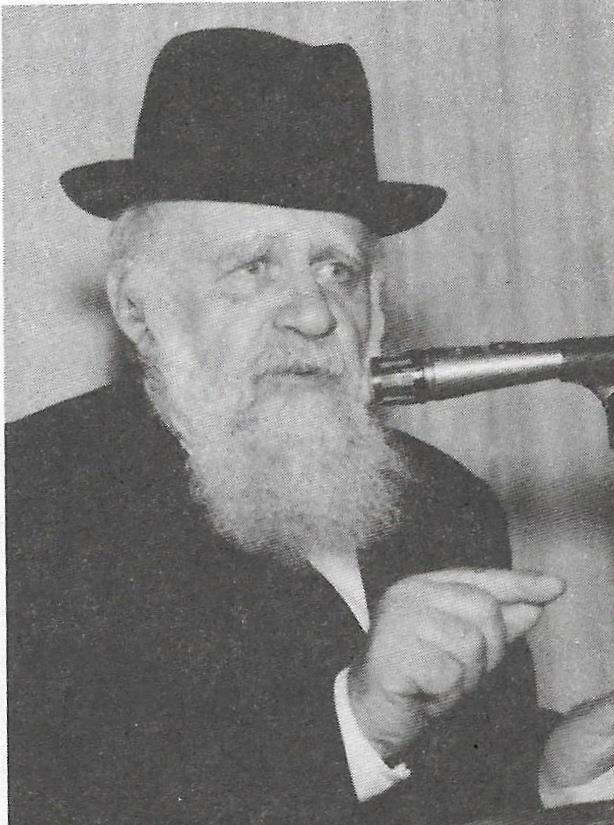  |
|
| |||||
This Google Custom Search looks only in this website. A Conversation with HaRav Yehoshua Eichenstein shlita About Our Situation
"We find ourselves in a most grim situation. This is a troublesome time for all of Jewry." These were the opening words expressed painfully by HaRav Yehoshua Eichenstein: Those who were murdered so brutally, all the wounded and the captured ones! It is terrible and horrific. May Hashem have mercy upon them all and rescue us from their hands.
The first principle which we must know is what Chazal taught us: Hashem looked into the Torah and created the world. Everything in the world, in Creation, is to be found in the Torah, written or hinted therein.
This is how the world has been conducted throughout the generations. Everything appears there, written or alluded to, from the very time of Creation, in Ha'azinu, in the lives of our Ovos and in many other places.
In order to learn the proper outlook regarding our situation today, we must see and attempt to understand the root or source in the Torah of what is now taking place, how to relate to it, and what behooves us to do under the circumstances.
Where, indeed, do we find the root in the Torah to this difficult present situation?
A person famous to the general public, an expert chef by profession and a Leftist in his world-view, published an interesting article expressing regret for his beliefs up till now. I must admit that I have no idea who he is but the very fact that his words aroused a storm in the media testifies that he is well known to the Israeli urbane public.
He writes as follows:
"I admit and confess that I was among the leaders of those crying for peace and publicly supporting it. For the past thirty years of my life, I have traveled throughout the world, from Norway to Jordan, all over Israel and the world. I had idyllic dreams about a great utopian world, replete with quiet and brotherly love.
"I am ashamed and beg the pardon of my people for having partaken in the big deception of the Left. I pray that the Creator forgive me. We must totally destroy the fiendish Hamas and their ilk. The Jewish People lives on forevermore! Shabbat Shalom!"
This article appeared in print in 1992, that is, 31 years ago. HaRav Wasserman was niftar on 2 Cheshvan, 5753 (October 29, 1992). He was about 93 years old.
Part 1
Rav Nachman Bulman, who knew HaRav Elazar Simcha Wasserman for almost fifty years, formulated what may be the central question:
"He wasn't a person who was looking for "madregas," but he had them. That's what a Yid is supposed to be. If you were to ask anybody who got to know Reb Simcha, `What was he?' the answer was not obvious. Certainly everybody knows that he was a talmid chochom, and an ehrlicher Yid, and a yirei shomayim, a baal midos tovos, a baal chesed godol and a true educator. And he was never inconsistent with his emes. But, with all this, it could still be asked, `What was he?'"
* * *
Outstanding Articles From Our Archives
Opinion & Comment
by Rabbi Shimon Margolin
Happiness! A much sought-after commodity.
But how many acquire it? The world is full of advertisements offering happiness - the holiday of a lifetime, a dream house and other less worthy suggestions. But do these really bring happiness? They may achieve short-lived pleasure, but long-term happiness is another matter.
Some people deceive themselves into thinking that they would be happy if they had made their million. But does wealth bring genuine happiness? As Rav Dessler zt"l points out (Michtav MeEliyohu, vol. 1, page 1), the millionaire may seem happy. But ask him personally and he may confide in you and tell you of his troubles with his business or his health or his family.
Others delude themselves with alternative ways to achieve happiness, but if these relate to material achievements or acquisitions, they are far from a true solution. Our Sages tell us (Pirkei Ovos 4:1), "Who is rich? He who is happy with what he has." Wealth does not bring happiness. It is the attitude to life, rather than the bank balance, which brings happiness.
Of course, a person has no right to say, "I'm not going to worry about money," and instead allow himself to fall into debt, when with a little more care he could have avoided this. If he sees no way of getting out of debt and the situation arose because of his negligence or lack of foresight, he is condemned as, "The bad man (who) borrows and does not pay back" (Tehillim 37:21).
What a person should not worry about is keeping up with the Joneses (or the Cohens). Just because my friends or neighbors have the latest modern gadgets in and around their home, or the latest model of car, does it mean I have to have these things too?
Opinion & Comment
by Dovid Leitner
Part 4
In the last article we elaborated on the different translations of the name Naftoli, and their respective connections to prayer. Rashi explained the word Naftulei as an expression of "persistent and obstinate in prayer, analogous to the constant twisting of fibers that produce a continuous thread."
When woolen fibers are sheared from the sheep's back, they have to be cleaned to remove any external dirt that adheres to the wool. Each individual fiber is coated with lanolin, a substance that keeps the sheep dry from the rain. This too is removed, by washing the wool in a large vat. The lanolin is extracted and used in manufacturing hand creams and lotions.
The fibers are then dried and passed through a carding process that aligns them all in one direction. The tongue of wool produced is now ready for spinning, a process that will interlock all the individual fibers together into a long and useful thread that can subsequently be woven into cloth.
Spinning is accomplished, for example, by twisting the tongue of wool in a clockwise direction. A problem arises when one lets go of this twisted thread. It has a natural tendency to unravel again in an anti-clockwise direction, reversing the previous spinning. In order to avoid this, two clockwise spun fibers are subsequently spun together in an anti-clockwise direction, which has a combined effect of stabilizing the spun wool. The initial clockwise spin has a natural tendency to unwind in an anti-clockwise direction, while the combined fibers that were spun in an anti-clockwise direction have an opposite tendency, to unwind in a clockwise direction.
These combined forces neutralize each other and there is no unwinding of the spun fibers at all. They remain in their manufactured state, the way they were intended to be. Every thread of wool is comprised of two plies that were individually spun clockwise, and then twisted together in the opposite anti-clockwise direction. To manufacture thicker threads, this same process is repeated, producing four or six ply wool. By this process of spinning, threads can be manufactured to any desired thickness and required length.
Rashi at the end of gemora Succos explains how the composition of the seventy-two-lettered Name of Hashem is found. There are three consecutive pesukim in the Torah (Shemos 14:19, 20, 21) that each contain seventy-two letters in them. These are combined to form seventy-two three-letter sets.
|
|||||




.jpg)


